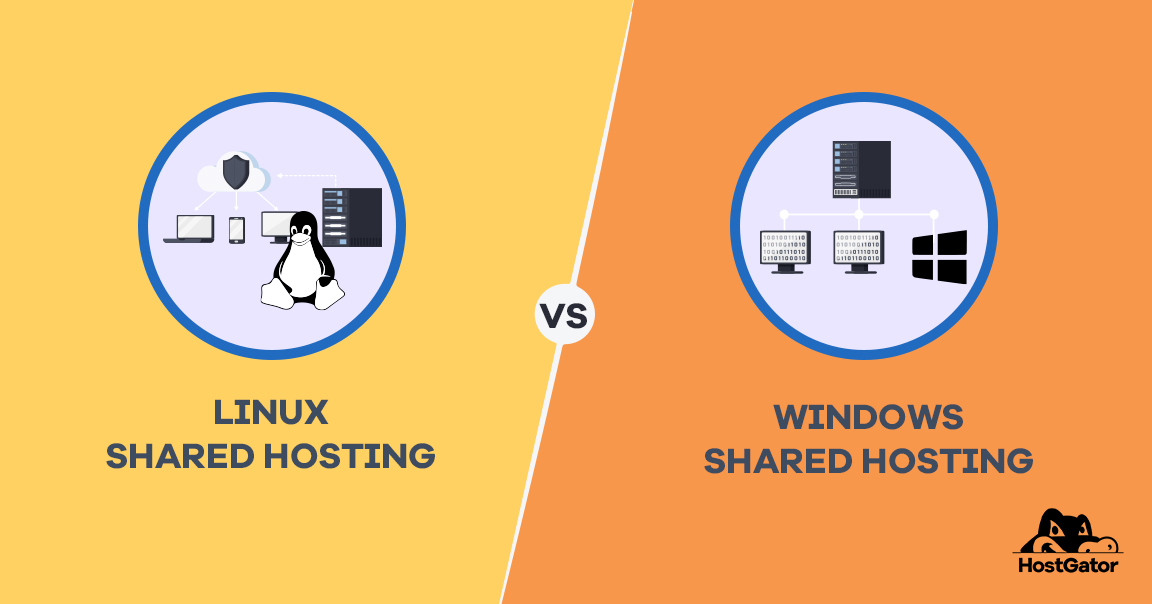An operating system is the foundation of a web hosting server. In essence, it’s the software on which all other software or applications run. Without an operating system, your web hosting server or even your PC is just a lot of electronic parts that can’t really communicate and work with each other.
Given that the operating system is crucial for any web hosting server, it makes sense to evaluate all the options currently available in the market and see which suits you best. When it comes to choosing an operating system, there are two top contenders — Windows and Linux.
Linux Vs Windows – Overview
Linux is an open-source OS that’s quite popular in the developer world. While Linux isn’t a huge player in the PC-world, when it comes to servers and hosting, it is quite popular. Windows, of course, is a Microsoft offering for servers.
For a long time, there was really no comparison between Linux and Windows in the server world. Linux was by far, the obvious choice. It was more stable, supported a lot of applications, and had a huge community of dedicated developers.
However, in the last few years, things have started to change. Microsoft has taken several steps to improve its server offerings, and as a result, Windows is now a viable option when you’re considering operating systems for your web hosting plan.
What is Shared Hosting?
Shared Hosting is a type of hosting where multiple websites reside on a server and share the space and resources of that server. These resources include RAM, memory, CPU, and so on. Shared Hosting is the most popular type of hosting. There are several reasons for this.
The primary reason, of course, is pricing. Shared Hosting is the most affordable type of hosting out there. This is because the costs of running and maintaining the server are shared by all the websites on the server. But Shared Hosting is also popular because it’s easy-to-use, secure, and offers great performance, and at that price, no other hosting type can claim to offer these things.
The Linux Shared Hosting vs Windows Shared Hosting battle has been waging for some time now. You can choose Shared Hosting with any OS you want – Linux or Windows. However, it is extremely useful to know the features of each so that you can choose the OS which perfectly fulfils your site’s requirements.
Linux for Shared Hosting
As noted earlier, Linux is a popular choice for hosting, and that’s true for Shared Hosting too. There are several reasons for this, including but not limited to:
1. Stability
Linux has been in the server business for a long time. The result is that it’s known for having extremely stable and customizable offerings. What’s more, given that it’s an open-source platform, Linux can be adapted for pretty much any need. Finally, the constant upgrades and developments in all Linux distributions ensure that you’re always ahead of the curve.
2. Security
Linux is known for having amazing security. The reason, again, is the huge developer community that’s always tinkering away at the code, looking for backdoors and fixing them. Add the constant updates that Linux gets, and you’re looking at a very secure environment.
3. It’s free!
The open-source nature of Linux offerings is a huge advantage. However, it’s important to note that while the OS itself may be free, you will have to pay for it to be set up if you’re not an expert yourself. But even with that considered, the fact that the OS is free makes a difference if you’re watchful of your budget.
Windows for Shared Hosting
While Linux may look like it has it all covered, Windows has its own benefits too, including but not limited to:
1. Easy setup
Windows is known for its intuitive and interactive Graphical User Interface (GUI). It is simply easier to work with than Linux, especially for beginners. Now, you don’t have to be an expert Linux user to use Linux hosting, but there’s a bit of a learning curve there because of the Command-Line Interface (CLI). With Windows, it’s all made really simple. Also, the fact that the majority of personal computers in the world use Windows, users can recognize and learn it better.
2. Some applications are Windows-only
There are several applications and features that are available only with Windows. There might be alternatives or slightly modified versions for Linux, but Windows has exclusive access to many applications. MS-SQL databases and .Net are just two of the many examples.
It’s important to mention that you can actually use .Net with Linux as well. But it’s just far easier to set up and use with Windows.
Linux Shared Hosting vs Windows Shared Hosting — which one should you opt for?
The answer may be a bit disappointing, but the fact is that there’s no better option here. These are just two different options, both of which have different use cases. The differences have been tabulated below*:
| FACTORS TO CONSIDER | WINDOWS | LINUX |
| Usually used by | Large corporations that want a uniform Windows platform | Small to medium-sized businesses, including blogs and personal websites |
| Control Panel | Plesk | cPanel |
| Security | While there are constant security updates, they are not as frequent as Linux | The large group of developers constantly work on identifying threats and fixing the security loopholes. |
| Pricing | High licensing fees | Open-source (free) |
| Ease of use | Recognizable and easy-to-use GUI interface | The CLI interface requires a bit of a learning curve |
*The table itself isn’t applicable to everyone, of course. If you choose a very expensive hosting company, even with Linux Hosting, you’ll have to pay more. The differences tabulated are just data points.
Do I have to know Linux to use Linux hosting?
No! You absolutely don’t have to know anything about how Linux works to use it. In fact, there are very few instances where you’ll actually have to do anything core Linux-based, so to say. For the most part, you’ll interact with an application called cPanel. It’s an intuitive, easy-to-use application. You don’t have to write code or anything. It’s a GUI (Graphic User Interface) application that has been designed to help people who are new to Linux.
The real learning curve is to get familiar with Linux terminology. Applications are sometimes referred to as ‘packets’ and so on. Once you start using it, you should be just fine.
Conclusion
The Windows vs Linux debate is an old one and one which will never really end. People have preferences, and that will inevitably come out when you’re getting recommendations from anyone. The best way to choose an Operating System is to carefully analyze your needs and then see which OS helps you the most.
What’s more, with HostGator you avail 24×7 dedicated customer support teams that will help you in case you get stuck somewhere. So, it’s crucial that you see what works the best for you and not worry too much about which OS is better. Eventually, there’s no better OS; there are just two different choices for you.
To know more about the other web hosting categories and to choose the right option for your business, visit our Hosting Blogs Category.









